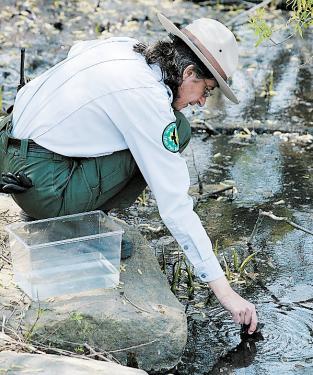Rescuing baby turtles turns out to be a snap
By Jason Eisenberg
It was an unseasonably hot and sunny day in late September, when a group of baby snapping turtles was born on the verge of the Parade Ground in Van Cortlandt Park. The temperature, which reached nearly 90 degrees, had tricked the hatchlings - each about the size of a quarter - into believing it was spring, the time when they would normally break free of their eggs.
Luckily for the little snappers, they caught the attention of several park visitors and workers.
"Within a span of less than 10 minutes, I suddenly had 12 baby snapping turtles in my possession," said Mara Pendergrass, a sergeant with the Urban Park Rangers. "First it was a group of joggers, then a person out walking and then one of our park's mounted officers. If these people had not found the turtles and brought them to me, there is no chance they would have made it through the winter."
A typical snapping turtle nest will hold between 40 and 50 eggs, so a large majority of the hatchlings were never recovered. However, for the dozen that were, it was like being granted a second chance at life.
The rescued baby snappers were distributed to several nature centers throughout the city, with some going to Brooklyn, others to Queens, Central Park and Inwood Hill Park and finally, two of them remaining in Van Cortlandt Park with Sgt. Pendergrass.
"I am definitely a turtle person and they always seem to find their way to me, so I love taking care of them," said Sgt. Pendergrass. "Not only did we house them, feed them and bring them outside to run around in the sun, but having them here also gave me the chance to educate visitors about this type of turtle."
The process of caring for the turtles over the winter - called "headstarting" - is intended to prepare them for going back into the wild when spring arrives. According to Sgt. Pendergrass, the hatchling turtles would not have been able to catch enough of their own food in time to build up fat for the winter and as a result, they would be too small to dig themselves deep into the mud for hibernation.
Throughout the winter, Sgt. Pendergrass fed the two babies on a daily basis. Sometimes she would give them ReptoMin - floating food sticks, specifically designed for turtles and other reptiles - and other times she would put live guppies in their tank. It was especially vital for the turtles to practice catching these living fish so they would be ready to hunt for tadpoles, shrimp, insects and other prey, once back in the wild.
"There is no doubt that these little guys are the definition of cute, but it is important to remember that they are not meant to be pets," Sgt. Pendergrass explained. "At full size, snapping turtles can be more than a foot-and-a-half in length and weigh up to 75 pounds, [and adults have the bite and tenacity of a pit bull]. So, with a life span of 40 to 50 years, they have to be put back in their natural habitat."
Now, almost six months later, this inevitable day had finally arrived. Last weekend, on a warm and sunny day much like the one on which they first came into the world, these turtles were reunited and released into several different areas of Van Cortlandt Lake. Nearly 20 spectators showed up to bid farewell to the snappers, most of which were now two to three times their original birth size.
While a few of the visitors got to carry the turtle tanks on the walk down to the lake, it was one young Kingsbridge resident who had an experience she will not soon forget. Six-year-old Melanie Jimenez, with her father Milo, mother Evelyn and older sister Jodi, all looking on, was chosen to release the final snapping turtle.
"I like turtles so it was fun," Melanie said, just a few minutes after lowering the last little snapper into the shallow water. "I got to hold him and see him up-close before he floated away in the water."
Her father, Milo Jimenez, said that he tries to keep the family involved with the park as much as possible. He knew that his daughters would enjoy this event in particular.
"I really think what the park did for these turtles is commendable," said Mr. Jimenez. "I completely support the rangers' effort in rescuing and caring for them, so I wanted my family to be a part of it."
As for Sgt. Pendergrass, she compares the situation to a "proud mother as her children go off to college."
She chalked up the early birth to climate change, but she wasn't overly concerned about its longterm effect on the turtle population. "People need to realize that turtles survived the dinosaur extinction, the Ice Age and several planet-wide climate swings," she said. "So if someone will be seriously affected by the impact of global warming it is not going to be them, it is going to be us."






